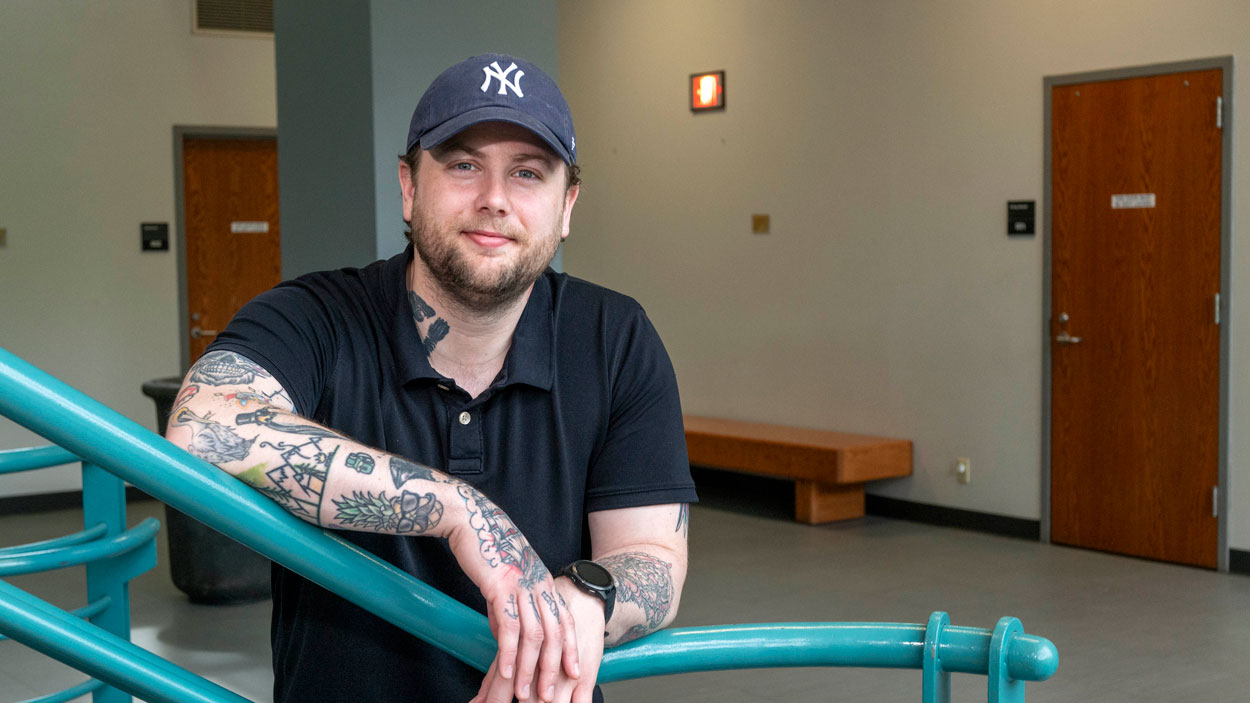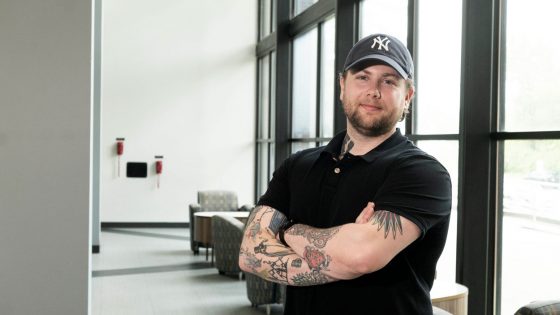
Colton Fitzjarrald is on track to graduate this December with a bachelor’s degree in mathematics and a minor in computer science. He plans to apply to PhD programs in computational biology. (Photos by Derik Holtmann)
Colton Fitzjarrald has been splitting his time this summer between an internship in the Geosciences and Artificial Intelligence Applications lab at the National Geospatial-Intelligence Agency’s Moonshot Labs, research on biophysics with Professor Sonya Bahar and a course in chemistry.
Next month, the University of Missouri–St. Louis senior will kick off his final college semester, including courses in complex analysis, mathematical statistics and organic chemistry as he completes his degree in mathematics with a minor in computer science. He also plans to be a saxophonist with the UMSL Wind Ensemble.
Fitzjarrald has followed a winding path to arrive where he is today.
“I’m actually going to graduate with over 170 credits because I’ve switched majors so many times,” said Fitzjarrald, who moved from physics to computer science to mathematics and also changed schools twice, taking courses at Pasco-Hernando State College and then the New College of Florida before coming to UMSL. “It took me a little bit, but I finally found what I liked.”
Charting a new course
Fitzjarrald hadn’t had a road map when he graduated from high school in the San Francisco Bay area. His parents and brothers hadn’t gone to college, so that wasn’t an expectation that was ever placed on him – though he always suspected it’d be important to his future.
“My family is very happy with the directions they went for their jobs, but I knew none of those really sounded right to me,” he said. “All my friends went to school. I had no idea what I wanted, but I knew I couldn’t really imagine my life without it. I just knew that had to be on there somewhere. School was my way of being able to choose what I wanted.”
Still, he didn’t rush into pursuing his degree. In fact, he once aimed to join the Peace Corps after high school but needed more volunteer experience to be qualified to go abroad. Instead, he applied and got accepted to the AmeriCorps program and worked domestically in several roles and locales over three years.
He spent a year in Nevada, working as a sawyer and thinning out trees in natural areas to help protect wildlife and prevent fires. Then he moved on to Kentucky and had a job in construction, helping to rebuild homes for elderly and economically disadvantaged rural residents. Finally, he moved onto Florida, where he served as a science tutor at several middle schools in St. Petersburg and also organized a summer program in STEM.
It was there he decided to go back to school, taking classes at Pasco-Hernando and then enrolling full-time at the New College of Florida.
“School has always made it feel like there’s progression in my life,” Fitzjarrald said. “I always felt like there was forward motion, and there was something to do, something to look forward to. I realized when I wasn’t in it, I just kind of felt like I wasn’t going anywhere. I was very excited to get back.”
He started out as a physics major, inspired by a childhood fascination with astronomy shows, but changed those plans after having his interest piqued by a course in computer science. He later added mathematics after being inspired by a course in calculus.
A new home
Fitzjarrald was helping pay for school by working as a math tutor when the COVID-19 pandemic hit in early 2020. The university closed its campus in response to the public health crisis, and he quickly learned he couldn’t continue his job.

Math major Colton Fitzjarrald has gained research experience while at UMSL through participation in an NSF REU as well as working with Professor Sonya Bahar in biophysics and at NGA’s Geosciences and Artificial Intelligence Applications Lab.
Needing to find another way to support himself, Fitzjarrald reached out to some high school friends and heard back from one working at World Wide Technology in St. Louis. The friend helped him get hired at the company, so he moved to the Midwest and began doing work rebuilding radio antennas for 4G and 5G networks.
Fitzjarrald did that job for a year – just long enough to establish in-state residency – before he started looking to go back to school. As the only public research university in Eastern Missouri, he quickly homed in on UMSL to continue his studies. The university had a much different atmosphere than the New College of Florida, a public liberal arts university with fewer than 1,000 students, the majority of whom live on campus. But Fitzjarrald found he fit well with the many nontraditional and first-generation students at UMSL.
The faculty too have proved to be supportive and encouraging as he’s worked toward his degree.
“When you take the initiative to reach out, they will help you as much as they can,” Fitzjarrald said.
He took a Calculus III course taught by Professor Emeritus Prabhakar Rao shortly after enrolling at UMSL and made it a point to pay regular visits to Rao’s office hours. Their discussions tended to expand beyond the course material.
“He was always so happy to just work through it with me,” he said. “That completely changed my experience.”
It’s ultimately what prompted him to follow his passion and focus his studies on mathematics.
Lessons beyond the classroom
Fitzjarrald had gotten involved in undergraduate research with Associate Professor Badri Adhikari in UMSL’s Department of Computer Science, but Rao encouraged him to seek out additional experience through the National Science Foundation’s Research Experience for Undergraduates program and wrote one of his recommendation letters.
In 2023, Fitzjarrald wound up getting accepted to a summer position with chemist Wilma Olson at Rutgers University in New Jersey. He helped map ribosomes and their life cycles. The research involved a lot of computational work that fit Fitzjarrald’s skills, and he got excited to do more.
Fitzjarrald – who has received the Eugene J. Meehan Scholarship and the Joseph and Mary Vogl Scholarship as well as the Triton Summer Scholarship, Provost Non Resident Scholarship and UMSL Gateway Transfer Scholarship – was eager to explore other research opportunities upon returning to UMSL after his REU. He credits Bahar, a professor in the Department of Mathematics, Physics, Astronomy and Statistics, for opening other avenues for him and helping him find the resources he needed to achieve his goals. That includes providing a chance to do research involving biophysics and connecting him with faculty members at other institutions doing interdisciplinary and quantitative work in biology.
Fitzjarrald has also developed a strong relationship with Associate Teaching Professor David Covert. It was Covert who informed Fitzjarrald about the internship at the GAIA Lab. Since starting there earlier this year, he’s been working on a project that deploys a machine learning algorithm that can be used to detect levees in lidar images of the Earth – work with potential implications for predicting flood risk.
He first met Covert through his involvement with the Math Club, for which Covert acts as the faculty advisor and Fitzjarrald served as president last spring. Covert credited him with growing social engagement with the club, including some overlapping initiatives with the Physics and Astronomy Club and Computing Club. Fitzjarrald helped organize a movie night celebrating the famous Indian mathematician Ramanujan, and the club also had a Pi Day celebration, complete with a pie-eating contest, in March.
“We do stuff like that, trying to reach out and get people in and share our love of math while also becoming more a part of the community on campus,” Fitzjarrald said.
One of the biggest ways he’s gotten involved on campus is through his work in the Supplemental Instruction Program for what will be six semesters. SI leaders assist faculty members in providing academic support for students in large, required or challenging courses. They are undergraduates who have done well in the course before, and they attend lectures, participate in class activities and serve as models for their peers. They also hold regular study sessions to assist students outside of class.
Covert said Fitzjarrald has excelled in the role.
“He is very outgoing and direct, and he is able to meet students where they are and determine whether they have any need for assistance,” Covert said.
Fitzjarrald has worked as an SI leader for Calculus II and Calculus III courses as well as for Linear Algebra, and it’s allowed him to expand on his previous work as a math tutor.
“SI is the closest thing to being a teaching assistant,” he said. “Being able to work with students in a subject I really love gives me experience teaching a subject, and working with students has been invaluable. That has made my experience at UMSL so much better, and a lot of friends I’ve made have been through the SI program.”
Widening his scope
This fall, Fitzjarrald plans to work as an SI leader for an Introduction to Probability and Statistics course with Assistant Teaching Professor Vinay Kanth Rao Kodipelly, but he aims to ultimately integrate his work in math with another field of science.
“All the research that I’ve done as an undergrad for the REU and my work here as well, it’s always been in computational biology or computational chemistry,” he said. “I really enjoy the science, and I think I want to go hard into those subjects.”
Fitzjarrald called it a regret that he didn’t choose a double major in biology or chemistry, but he plans to make up for that by pursuing a PhD in computational biology. He will start applying to graduate programs next spring.
“I want to take all these skills that I’ve learned and apply them to science,” Fitzjarrald said. “There are a lot of different things you can do, but I think the one that’s the most straightforward is modeling, where you’re trying to model these systems in biology. Obviously, what’s underpinning that is different statistical information and a math model to understand how these things work. You can learn how a population will grow or bacteria decay.”
Fitzjarrald isn’t sure an academic position is in his future because he wants to have more control over where he goes. But he expects to find plenty of jobs using computational biology in private industry.
“Academia is just so competitive, and I don’t want that kind of stress,” he said. “But I know there is a plethora of opportunities out there for me.”














